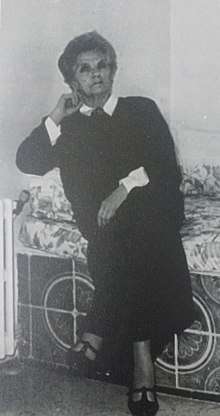Radhia Haddad
Radhia Haddad (Arabic: راضية بن عمار; March 17, 1922 - October 20, 2003) was a Tunisian feminist activist, and former chairperson of the National Union of Women of Tunisia for fifteen years.[1]

Biography
Born Radhia Ben Ammar ( راضية بن عمار ) on March 17, 1922 was the daughter of Salah Ben Ammar. She grew up in a family of traditional Tunisian bourgeoisie intellectuals. She had her primary studies in French at the French School of Franceville. But, as a girl, she was forced by her parents to leave school at twelve years old after obtaining her primary school certificate. She later wrote about priority in education was given to the males in her family: complaining that "no sacrifice was deemed too great to facilitate the studies of my brothers". She nevertheless pursues Arabic language courses at home and learned a lot from her brother, the future politician and activist for human rights Hassib Ben Ammar, with whom she often discusses reading his college books. Radhia Haddad, compelled to wear the traditional Tunisian dressing of the face veil, revolted and refused to leave the house. She took advantage of a visit to their house by a doctor, Abderhaman Mami, whenever someone fell ill to discuss political activities of the Destour and Neo-Destour political parties in Tunisia.[2][3][4]
References
- Badri, Balghis; Tripp, Aili Mari (February 15, 2017). Women's Activism in Africa: Struggles for Rights and Representation. Zed Books Ltd. ISBN 9781783609116.
- "Et Bourguiba libéra la femme – JeuneAfrique.com". JeuneAfrique.com (in French). August 28, 2006. Retrieved November 23, 2017.
- "Radhia Haddad : - Divergences". www.divergences.net (in French). Retrieved November 23, 2017.
- Leclerc, Annie (March 1, 2001). Parole De Femme (in French). Arles: Actes Sud. ISBN 9782742731817.
External links
![]()